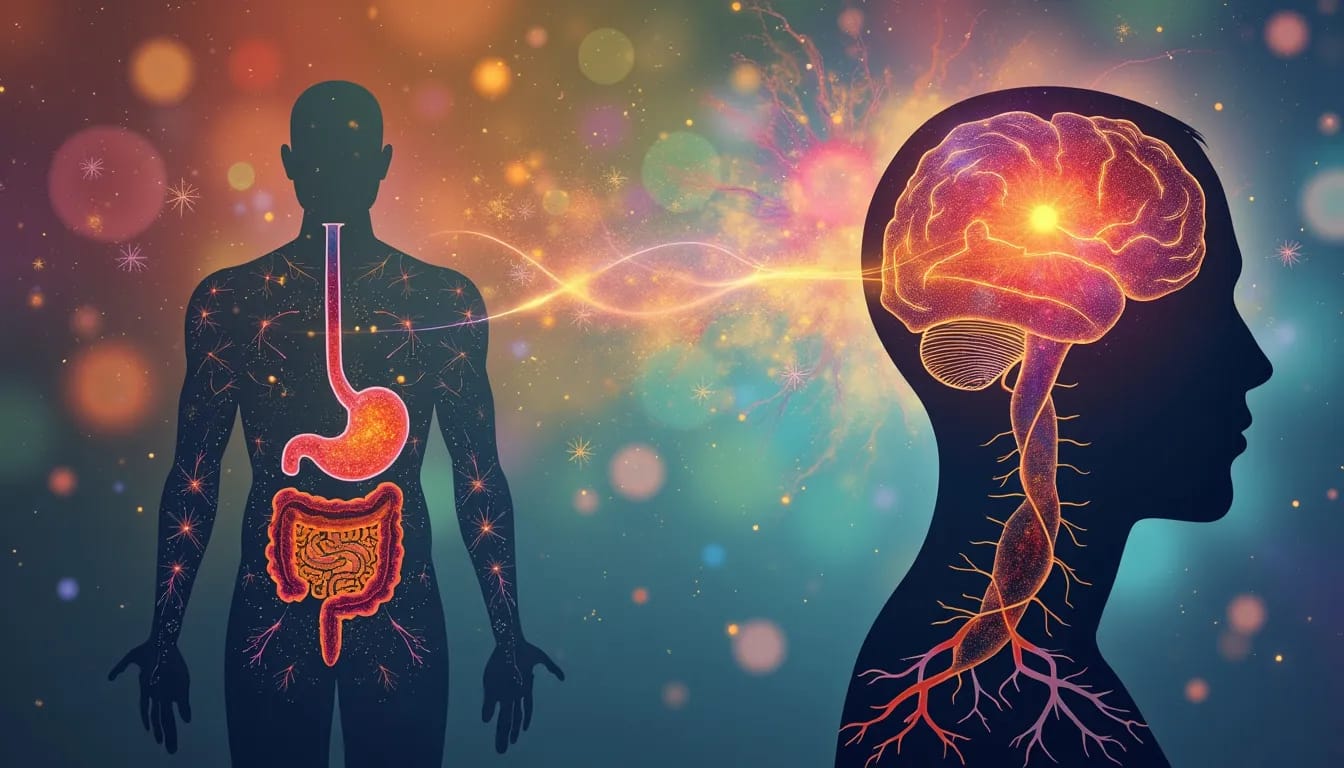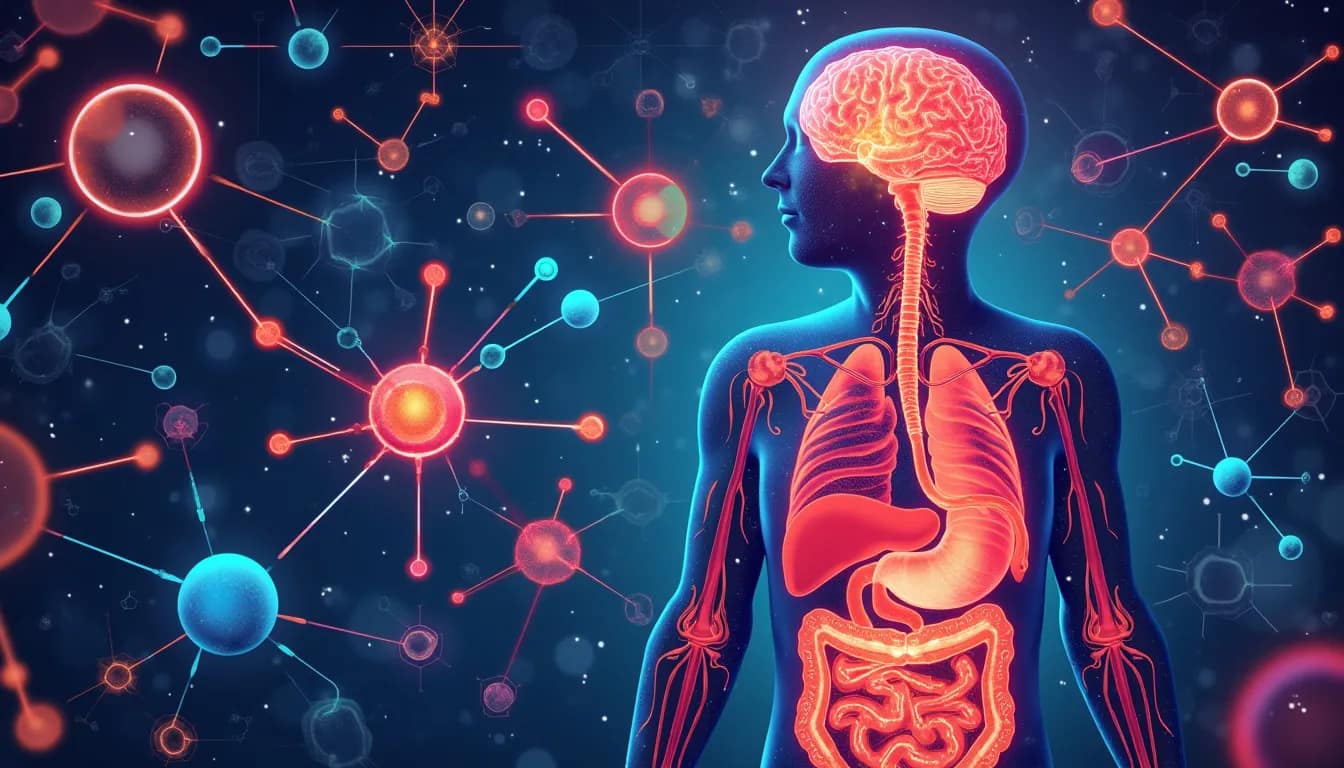In recent years, more people are discovering the profound connection between gut health and mental well-being, often sparking the thought: could the state of our gut really influence our mind? Our understanding of gut health has expanded beyond digestion to reveal its crucial role in our overall health, particularly mental health. Central to this discovery is the concept of the gut-brain axis, a complex communication network that links our brain to our gut. Understanding the relationship between these two seemingly disparate systems is not just fascinating; it’s essential for anyone looking to enhance their mental and emotional well-being.
The gut-brain axis is a two-way communication system involving biochemical signaling between the gastrointestinal tract and the central nervous system. It turns out that the gut, often referred to as the second brain, produces neurotransmitters like serotonin and dopamine, which play key roles in regulating mood and emotions. Furthermore, the vast community of bacteria in the gut, known as the gut microbiota, has been found to have significant influence over our mental states. This intimate connection underscores the importance of nurturing our gut health not just for physical well-being, but for psychological balance and mental clarity as well.
As we delve deeper into the science behind this connection, backed by numerous studies and research findings, it becomes clear that maintaining a healthy gut can lead to improved mental health. Through mindful dietary choices, the inclusion of probiotics and prebiotics, and adopting holistic lifestyle changes, one can significantly impact their mental and emotional health. This holistic approach provides not only immediate benefits but also long-term well-being. By prioritizing our gut health, we take a pivotal step towards achieving a balanced, healthy mind.
Introduction to Gut Health and Mental Well-Being
In recent years, the importance of gut health has come to the forefront of discussions about overall wellness. More than just a digestive system, the gut is now understood to play a significant role in our mental well-being. This connection is often referred to as the gut-brain axis, a bi-directional communication system between our gut and brain.
Consider this: Have you ever felt butterflies in your stomach when you’re nervous, or experienced digestive distress during times of intense stress? These are everyday examples of how closely linked our gut and brain really are. By better understanding this connection, we open the door to improving both our physical health and our mental well-being.
The Significance of Gut Health
Gut health refers to the balance of microorganisms that live in the digestive tract. These microorganisms, often called the gut microbiota, are essential for digestion, absorbing nutrients, and protecting against pathogens. When our gut microbiota is out of balance, it can lead to a variety of health issues, including digestive problems, immune system dysfunction, and even mental health conditions like anxiety and depression.
- Digestive Health: A balanced gut is crucial for proper digestion and nutrient absorption. When our gut is healthy, we process food efficiently and absorb the essential nutrients our bodies need.
- Immune Function: Approximately 70% of our immune system is located in the gut. A healthy gut helps to keep our immune system in check, warding off infections and diseases.
- Mental Health: There’s growing evidence that our mental health is significantly influenced by the state of our gut. Imbalances can contribute to mood disorders, stress responses, and cognitive functions.
Introducing the Gut-Brain Axis
The term gut-brain axis refers to the complex communication network linking the gut and the brain. This system consists of direct and indirect pathways, including the central nervous system, the endocrine system, the immune system, and the enteric nervous system, which is often called the second brain because it can operate independently of the brain.
One way this communication occurs is through the vagus nerve, a critical component of the parasympathetic nervous system, which directly connects the brain and the enteric nervous system. Another pathway involves neurotransmitters and signaling molecules that are produced by the gut microbiota but have significant effects on brain function.
Why Understanding This Link is Crucial
Understanding the link between gut health and mental well-being is not just a scientific curiosity—it’s a potential pathway to better health. By recognizing how our gut impacts our mental state, we can take proactive steps to nurture our gut health and, in turn, support our mental well-being. Here are a few reasons why this understanding is so important:
- Holistic Health: We often treat our body and mind as separate entities, but the gut-brain axis highlights how interconnected they are. By caring for our gut, we also tend to our mind.
- Personal Empowerment: Rather than feeling at the mercy of mental health challenges, understanding this connection empowers us with tools and knowledge to improve our health.
- Practical Applications: Knowing how to support gut health can give us tangible ways to manage stress, improve mood, and enhance cognitive function. It makes the science actionable in our daily lives.
One simple and interactive way to start exploring this relationship is to keep a journal. Track what you eat, your digestive health, and your mood over a few weeks. Reflect on any patterns you notice. Are there certain foods that seem to correlate with better or worse mental states? This can be a powerful tool to start personalizing your approach to gut health and mental well-being.
Remember, the mind, body, and spirit are all interconnected. By fostering a nurturing relationship with our gut, we can create ripples of positive impact throughout our entire being.
The insights we gain from understanding the gut-brain connection can lead us to a more balanced, harmonious, and resilient state of health. Let’s embrace this journey together, supporting each other with compassion and curiosity as we learn more about ourselves and the incredible inner workings of our bodies.
Scientific Basis of the Gut-Brain Connection
To truly appreciate the profound link between gut health and mental well-being, it’s essential first to understand the intricate communication network known as the gut-brain axis. This fascinating system illustrates just how intimately connected our gut and brain are, influencing not only our physical health but our emotional and psychological states as well.
Explanation of the Gut-Brain Axis: How the Gut Communicates with the Brain
The gut-brain axis is a complex bidirectional communication network between the gastrointestinal system and the central nervous system. This connection involves hormonal, neural, and immune pathways, creating a constant dialogue between the gut and the brain.
One of the primary pathways is the vagus nerve, which acts as a superhighway transmitting signals directly from the gut to the brain and vice versa. Additionally, neurotransmitters produced in the gut, such as serotonin, dopamine, and gamma-aminobutyric acid (GABA), play significant roles in regulating mood and cognitive functions.
The enteric nervous system, often referred to as the second brain, is another critical part of the gut-brain axis. This network of neurons embedded in the lining of the gastrointestinal system operates independently of the brain and spinal cord, yet remains in constant communication with them.
Role of the Gut Microbiota in Mental Health
Our gut is home to trillions of microorganisms collectively termed the gut microbiota. These bacteria, viruses, and fungi are crucial in maintaining not only digestive health but also supporting mental well-being.
The gut microbiota produces numerous metabolites, some of which can cross the blood-brain barrier, affecting brain function and behavior. For instance, short-chain fatty acids (SCFAs), produced by the fermentation of dietary fibers by gut bacteria, are known to reduce inflammation and have been linked to reduced anxiety and depression.
Moreover, an imbalance in gut microbiota, often referred to as dysbiosis, has been associated with various mental health disorders, including depression, anxiety, and autism spectrum disorders. This underscores the importance of a balanced and diverse gut microbiome for maintaining optimal mental health.
Key Studies and Research Findings Supporting the Gut-Brain Connection
Numerous studies and clinical trials have revealed compelling evidence supporting the gut-brain connection. Here are a few key findings:
- A landmark study published in Nature Microbiology found that individuals with a higher diversity of gut bacteria reported lower levels of stress and anxiety. The researchers highlighted the potential of targeting gut microbiota as a novel approach to treating mental health disorders.
- In a 2017 study in the journal Gastroenterology, researchers discovered that probiotic supplements significantly improved mood and cognitive function in healthy participants. These findings suggest the potential of probiotics in managing conditions like depression and anxiety.
- A 2019 study in Psychosomatic Medicine demonstrated that participants who followed a diet rich in prebiotics experienced less stress and improved sleep quality. Prebiotics, indigestible fibers that fuel beneficial gut bacteria, appear to have a direct impact on mental well-being.
Additionally, emerging research indicates that the gut-brain connection might play a role in neurodegenerative diseases such as Parkinson’s and Alzheimer’s. This growing body of evidence suggests that nurturing our gut health can have far-reaching impacts on both our mental and overall health.
Reflect for a moment: How often do you listen to your gut feelings? If the link between your gut and brain is so influential, perhaps there’s more wisdom in those feelings than you might have thought. Take a deep breath, acknowledge your body’s signals, and appreciate the remarkable connections within you.
To deepen your understanding of this topic, consider reflecting on your own experiences. Have you ever noticed changes in your mood or mental clarity after consuming certain foods or during periods of digestive discomfort? Understanding these personal connections can be the first step towards better gut health and improved mental well-being.
Improving Gut Health for Better Mental Well-Being
Diet and Nutrition Tips for a Healthy Gut
What we eat profoundly impacts our gut health and, in turn, our overall mental well-being. To foster a healthy gut, it’s crucial to incorporate a balanced diet rich in diverse, whole foods. Here are a few tips:
- Fiber-Rich Foods: Foods like vegetables, fruits, legumes, and whole grains are excellent sources of dietary fiber, which helps promote a healthy gut microbiota. Aim to include a variety of these foods in your daily meals.
- Fermented Foods: Yogurt, kefir, sauerkraut, and kimchi are rich in beneficial bacteria that can enhance gut health. Adding these to your diet can strengthen your digestive system and improve mental well-being.
- Limit Sugar and Processed Foods: High-sugar diets and processed foods can disrupt the balance of good bacteria in the gut. Even small changes, like reducing your intake of sugary snacks and opting for whole foods, can make a significant difference.
Probiotics and Prebiotics: Benefits and Food Sources
Probiotics and prebiotics play essential roles in maintaining gut health. Understanding their benefits and incorporating them into your diet can lead to improved mental well-being.
- Probiotics: These are live, beneficial bacteria that can help maintain and restore the balance of your gut microbiota. Common sources include fermented foods like yogurt, kimchi, sauerkraut, and kombucha.
- Prebiotics: These are non-digestible fibers that act as food for the gut bacteria, helping them grow and thrive. Foods rich in prebiotics include garlic, onions, leeks, asparagus, bananas, and whole grains.
Incorporating a mix of both probiotics and prebiotics in your diet creates a synergistic effect, supporting a healthy and diverse gut microbiome.
Lifestyle Changes to Support Gut Health: Stress Management, Exercise, and Sleep
Your lifestyle choices also play a critical role in gut health and, consequently, your mental well-being. Here are a few tips to support your gut through mindful living:
- Stress Management: Chronic stress can negatively impact your gut microbiome. Practices like mindfulness meditation, yoga, and deep-breathing exercises can help manage stress levels. Take a moment each day to engage in a calming activity – this not only nurtures your mind but also your gut.
- Regular Exercise: Physical activity promotes the growth of beneficial gut bacteria. Aim for at least 30 minutes of moderate exercise, such as walking, jogging, or cycling, most days of the week. Activities like these can improve both your physical and mental health.
- Adequate Sleep: Your gut health can be significantly affected by your sleep patterns. Strive for 7-9 hours of quality sleep per night to support the healthy functioning of your gut and mind. Establishing a bedtime routine, avoiding screens before sleep, and creating a comfortable sleep environment can promote better rest.
Long-term Benefits of Maintaining a Healthy Gut for Mental Well-Being
The rewards of nurturing a healthy gut extend far beyond immediate improvements in digestion. Over time, a balanced gut microbiome can contribute to enhanced mental clarity, reduced symptoms of anxiety and depression, and an overall sense of well-being.
Imagine waking up feeling rested, with a calm mind, ready to embrace the day. This is more achievable than you might think by consistently practicing the tips above. Many individuals have shared their stories of transformation:
“Since I started focusing on my gut health, I’ve noticed a substantial improvement in my mood and energy levels. I feel more balanced and less anxious. It’s incredible how these simple changes can have such a profound effect.” – Jane, a mindfulness coaching client
Remember, small, consistent changes are key. Reflect on your current habits, and identify areas for improvement. Maybe you start by integrating a new fiber-rich food into your diet this week or practicing a stress-relief technique daily. Each step you take is a step towards better mental well-being.
Equip yourself with the knowledge and tools to nurture your gut, and you’ll find a path to mental clarity, peace, and joy. It’s all interconnected, and your journey to a healthy mind begins with a healthy gut.
As we draw our exploration of the link between gut health and mental well-being to a close, it’s clear that our mental and physical health are intricately connected in ways that many of us might not have considered before. The gut-brain axis is a fascinating example of how different systems in our body work together in a delicate balance, influencing not just our physical health, but our moods, thoughts, and overall mental state.
By acknowledging the critical communication between our gut and brain, we open the door to holistic health improvements that go beyond mere symptom management. Understanding this connection enables us to take proactive steps in nurturing our gut health, which in turn supports our mental well-being. It’s reassuring to know that by making thoughtful choices about what we eat, incorporating probiotics and prebiotics into our diet, and adopting a lifestyle that includes regular exercise, stress management, and adequate sleep, we can profoundly impact how we feel every day.
The studies and research we’ve discussed provide a solid foundation of evidence. Yet, the real power lies in your hands—and your everyday choices. It’s about small, manageable steps that collectively lead to significant, positive outcomes. Whether it’s choosing a balanced diet rich in fiber and fermented foods, dedicating a few minutes a day to mindfulness or exercise, or simply getting a good night’s sleep, each action contributes to a healthier gut and a happier mind.
Reflecting on the powerful stories and testimonials shared by individuals who have experienced the benefits of prioritizing gut health, it’s inspiring to see how these interventions can transform lives. As you embark on your journey towards better gut health, remember to be patient and compassionate with yourself. Every step you take is a step towards a stronger, healthier connection between your gut and your brain.
In the end, the pursuit of improved gut health is not just about better digestion or fewer stomach issues, but about fostering a balanced mind, a resilient body, and a harmonious spirit. Embrace this holistic approach, and let it guide you to a state of well-being where both your gut and your mind can thrive together.



